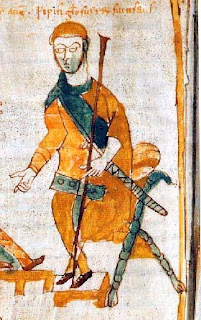One of these new buildings was a small church built for St. Zeno. Zeno of Verona (c.300 - 371) was an early saint with a couple of backstories. One says that he came from Mauretania, an area in Africa known for Berbers, where he tutored children in their schoolwork and taught them about Christianity. Another theory was that he was a follower of Athanasius, an opponent of Arianism, who visited Verona in 340. The style of the nearly 100 sermons we have from Zeno support an African origin. One tradition says he was the eighth bishop of Verona, and Gregory the Great calls him a martyr.
Zeno supposedly—among his other good works—converted man from Arianism to Roman Christianity. Despite this, the Arian Christian Theodoric thought it wise to build a church for Zeno. The place was expanded into a basilica under King Pepin of Italy (Charlemagne's son) in the 9th century. In the 10th century, Zeno's body was moved to a different church after the building was damaged by Magyars, but it was returned eventually to its original crypt. The church was rebuilt with the patronage of Holy Roman Emperor Otto I. The current expanded building was completed in 1398.
You can learn more about the church and see its interior here. The church's sculptures show scenes from Theodoric's life. One scene is Theodoric riding into Hell (see it in the previous post), but also there are depictions of Theodoric's fight with Odoacer. Not depicted, however, is a famous story having nothing to do with Theodoric but known to all. The crypt below the church, where St. Zeno's bones lie buried, is supposed to be the crypt where two young lovers killed themselves because their families denied them their union. These two families of Verona were the Montecchi and Cappelletti, although you may know them as the Montagues and Capulets.
Regarding Gregory the Great: he has been mentioned only a few times in this blog, but he made a decision once that affected the whole of English History (and probably Western Civilization) forevermore. I'll explain next time.

